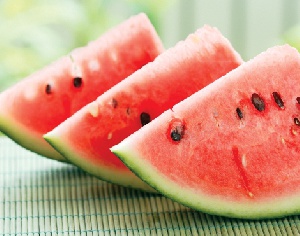Watermelon is going waste in the Upper Manya Krobo District for lack of market for the farmers.
The area is endowed with fertile lands for the growing of watermelon and as such most farmers cultivate it on large scale but lack of market is threatening their investments.
Heaps of watermelons are found by the road side to attract commuters using the Nkurakan- Asesewa road but because the patronage is low, the fruits, after some weeks begin perishing.
According to experts, watermelon belongs to the protective food groups, it contains a lot of fiber and water which allows free bowels and help improve the human immunity against diseases.
It is also good for diabetics and is widely believed to have properties that prevent prostate cancer in men. This came to light when the Ghana News Agency (GNA) Media Auditing and Development Tracking Projects team visited the area and interacted with the farmers.
The project aims at promoting transparency and accountability and is sponsored by Star-Ghana. Watermelons naturally have a shelf life of three weeks when stored well, however it is highly perishable and when rotting, it could not be detected outside but rot from within.
Large sizes of watermelon that are sold for prizes ranging from Gh ?10.00 to Gh ?15.00 cedis in Koforidua and other urban areas is going for between Gh ?3.00 and Gh ?5.00 cedis in the area.
According to some of the farmers, who spoke to GNA, because of bad roads in the area, it is difficult to get vehicles to cart their melon from the farm on time to the road side and therefore most of the produce perished on the farm. Again, the few vehicles which ply the roads tend to charge exorbitantly due to the poor nature of the roads.
When asked why they don’t send their watermelon to market centers such as Koforidua or Accra to sale, Madam Korkor Wayo, one of the farmers, said they had no space in the markets and so find it difficult to sell.
She said one time she sent her produce to Koforidua but because she had nowhere to sell, she had to sell all to a retailer at a cheap price and at the end was not able to pay for the transportation.
Business News of Friday, 30 May 2014
Source: GNA













